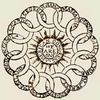 For all intents and purposes, it appears as though Hillary Rodham-Clinton is about to win her party's Kentucky primary by a convincing margin. But it's almost certain that she won't be the nominee. Adam Nagurney of the New York Times speculates why
For all intents and purposes, it appears as though Hillary Rodham-Clinton is about to win her party's Kentucky primary by a convincing margin. But it's almost certain that she won't be the nominee. Adam Nagurney of the New York Times speculates why:
WASHINGTON — When it comes time to recount the story of Senator Hillary Rodham Clinton’s descent from inevitable nominee to defeat at the hands of Senator Barack Obama — assuming that is how this ends up — there is no shortage of mistakes by the Clinton campaign to put on the what-went-wrong list.
But without in any way discounting the travails of the Clinton organization, there have also been a series of external events in this Democratic nominating fight — events largely beyond the control of Mrs. Clinton’s campaign — that, had they gone differently, might just have resulted in a different outcome. Politics is often as much about luck as it is about skill; the Clinton campaign arguably ran short on both this year.
Here, in no particular order, are some of the factors and developments that undercut her candidacy, some self-inflicted, others inflicted upon her.
The Timing of the Edwards Endorsement
Senator John Edwards, after weeks of holding back, decided to endorse Mr. Obama on the Wednesday after Mrs. Clinton enjoyed a rare bit of good news, a 41-point defeat of Mr. Obama in West Virginia. Mr. Edwards’ decision to move that day — and in prime time, no less — took the wind out of the Clinton campaign’s sails, depriving it of what seemed to be at least a chance to get back in the hunt.
Mrs. Clinton, on something of a victory lap, had taped an interview with Charlie Gibson to be aired on The World News Tonight on ABC that evening. Instead, for the East Coast feed of the program — the most-watched feed, the one broadcast in Washington, D.C. — ABC went live to Mr. Edwards endorsing Mr. Obama in Michigan. And the Clinton interview? Relegated to the late feeds and the ABC Web site.
Was there a kick-the-wounded-puppy feeling to all this? Well, yes. But this is politics, after all. And it certainly appeared to be successful: The time just after the West Virginia victory might have been the last window Mrs. Clinton had to get superdelegates to hear her case that Mr. Obama is a flawed general-election candidate.
Michigan and Florida
The importance of these two states being relegated to the sidelines — because they defied the Democratic Party and held their primaries earlier than party rules allowed — can not be overstated.
For Mrs. Clinton, the best of all worlds would have been for the Democratic National Committee to do what the Republican National Committee did to Florida and Michigan for breaking the rules: cut the delegations in half, but still permit the primaries to go on. That outcome — assuming she won in Michigan and Florida, which seems a pretty good bet — might have given Mrs. Clinton a burst of momentum going into the “Super Tuesday” primaries of Feb. 5, and possibly allowed her to emerge that day with a significant lead in delegates, not to mention the popular vote; with a line-up of big state victories; and perhaps with enough momentum to withstand the 11-state winning streak that Mr. Obama reeled off after Feb. 5.
The Clinton campaign was acutely aware of the problem from the start. They were out-maneuvered, particularly when the four states that started the process — Iowa, New Hampshire, South Carolina and Nevada — got the other candidates to sign an agreement pledging not to campaign in Michigan and Florida, thereby throwing into question the legitimacy of any voting there.
The Drudge Report
In October, The New York Times published an article examining the relationship between Mrs. Clinton and the Drudge Report. The article related how the Drudge Report, which historically had tormented the Clintons, had begun routinely posting items boosting Mrs. Clinton’s campaign, at the prompting of an intermediary between Mrs. Clinton’s campaign and the Web site.
For the Clinton campaign, things changed almost overnight after that: The Drudge Report returned to being a vehicle driving negative stories about Mrs. Clinton, bad news about the Clinton campaign got extensive attention, and Mrs. Clinton’s war room spent many hours trying to tamp down rumors and suspect information being trumpeted on the site.
The Tipping Scandal
What if an NPR reporter had checked with the Clinton campaign before posting an article reporting the complaints by an Iowa waiter that Mrs. Clinton had stiffed her for a tip? After it appeared, the Clinton campaign produced a sheaf of material rebutting the claim. Yet even though the article was not quite right — NPR posted a clarification — the damage was done. The story spread across the state and the country, feeding the image of Mrs. Clinton as entitled and imperious, at a time when she was already struggling to find her legs in Iowa, a state she went on to lose.
Immigrants Behind the Wheel
Eliot Spitzer, the former New York governor, certainly wasn’t thinking about presidential politics when he proposed in New York that illegal immigrants be granted driver’s licenses. But when Mrs. Clinton was asked about his proposal at a debate last year, she gave an equivocal answer — make that answers, since she seemed in the course of the debate to say both that she opposed it and that she supported it — in what may well have been the single most politically damaging moment of her campaign. It encapsulated the image of Mrs. Clinton as cautious, calculating and disingenuous. That night is arguably when the descent began.
The Return of Joe Trippi
When Joe Trippi, a veteran of many Democratic campaigns, signed on with Mr. Edwards late last year, the pitch of the Edwards campaign instantly turned more populist and tougher, and took aim at Mrs. Clinton. That may have not done much for Mr. Edwards — he quit the race on Jan. 30 — but it sure put Mrs. Clinton on the defensive, and took the burden of attack off Mr. Obama.
Bill Clinton
Granted, former President Clinton may have helped his wife in Pennsylvania and perhaps in Indiana. But it seems hard to argue that Mr. Clinton was anything but a net negative for Mrs. Clinton overall. Why didn’t Mrs. Clinton and her team simply put him on a tighter leash? Pose that question to any member of the constantly frustrated Clinton command who might have preferred that Mr. Clinton take a lower-profile and less combative stance.
Planted Questions and False Rumors
It is hard to exaggerate how much damage Mrs. Clinton suffered from two things that her supporters got busted for doing early on: Planting questions in audiences at town halls in Iowa, and forwarding e-mail messages suggesting that Mr. Obama is a Muslim. (He is not.)
The Clinton campaign vigorously denied that these efforts were approved or orchestrated. Still, the stories about them, eagerly circulated by her opponents, underlined the notion that Mrs. Clinton was scripted and calculating, while increasing the antagonism between Mr. Obama’s supporters and the former first lady.
For some observers, Rodham-Clinton's refusal to do the honorable thing throw in the towel and continue pursuing the nomination looks like a plucky last stand.
Others assert that by continuing the electoral struggle, she'll do little other than tear the Democratic Party apart and make it all but impossible for them to win the presidency in November.
Thus paving the way for her to grab the nomination in 2012, where she would face a nearly 80-year old John McCain or an untested first-time Republican nominee. (Huckabee?)
What puzzles me is how many conservatives (including radio commentator comedian Rush Limbaugh) seem to cheering for a Clinton nomination.
They should be careful what they ask for.
I remember back in 1992 when many Republicans were itching to square-off against Bill Clinton.
And they got what they asked for. Labels: Countess of Chappaqua Chronicles, EduDecision 2008
 The 173rd edition of The Carnival of Education (hosted this week by Bluebird's Classroom.) has opened its midway!
The 173rd edition of The Carnival of Education (hosted this week by Bluebird's Classroom.) has opened its midway!












